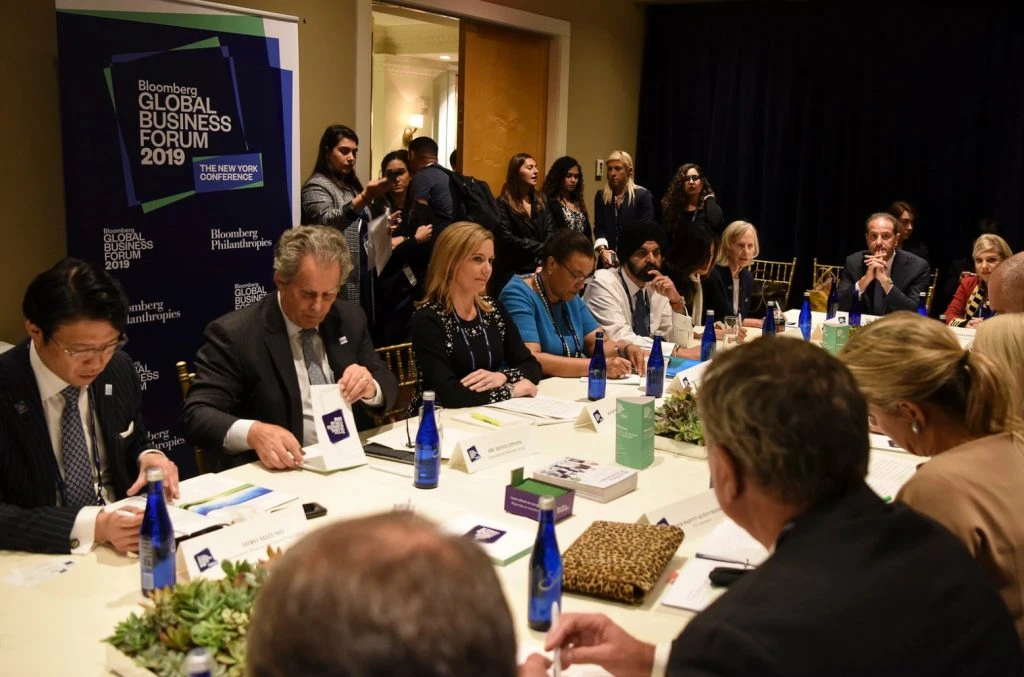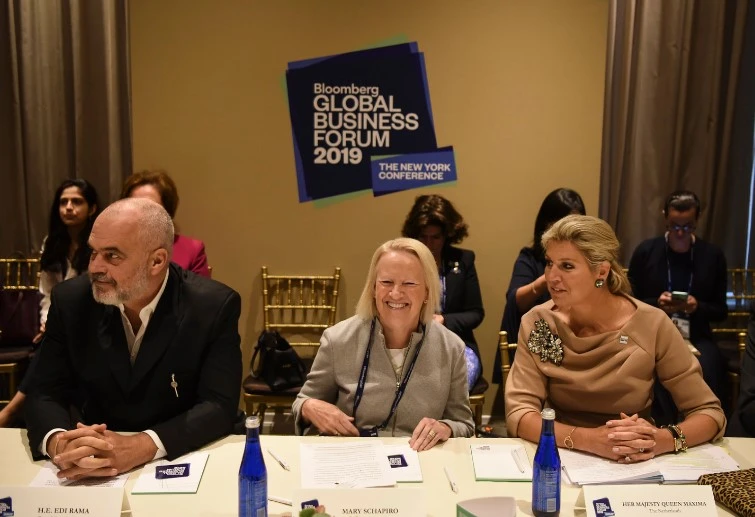Global leaders from public and private sectors convene to discuss gender equality
September 27, 2019

By Kiersten Barnet, Global Head of the Bloomberg Gender-Equality Index
At this week’s Bloomberg Global Business Forum, the world’s most influential leaders from across the public and private sector convened to discuss the theme of restoring global stability. In addition to providing a venue for meaningful conversations on the climate crisis and the importance of collaboration, the event featured a roundtable titled Gender Equality: Close the Gap, Drive Returns that covered the economic impacts of gender equality.
Mary Schapiro, Advisor to the Founder and Chairman and Vice Chair for Global Public Policy at Bloomberg LP, joined me as host for the roundtable, which featured men and women from across the public and private sectors who have made significant progress with regard to gender-related issues. I was heartened by the lively discussion that included fresh insights on how to balance the scales between men and women globally. Hearing from representatives who came from around the world – including The Netherlands, Albania, India, Japan – and lead major financial institutions, nations or nongovernmental organizations was inspiring, especially considering the growth we have seen over time with our own Bloomberg Gender-Equality Index.
Mary kicked off the conversation with an overview of how tackling gender inequality will lead to economic growth and stability.
“We have learned that achieving gender equality is not a natural progression of the human race, so we must be intentional in our approach. Being intentional includes ensuring we are collecting the right data with which to make decisions, making it available to all stakeholders, and identifying proxy measures that can be used where gaps in data still exist.”

Her Majesty Queen Máxima of the Netherlands participated in the roundtable by sharing highlights from her work in this area as the UN Secretary-General’s Special Advocate for Inclusive Finance for Development. Specifically, Her Majesty advocated for taking into account the differences between men and women when it comes to financial products.
Emphasizing the macroeconomic implications of gender equality, David Lipton, Acting Managing Director of the International Monetary Fund, presented new research from the IMF that supports the argument for inclusion:
“It makes a difference to your macroeconomy whether you have gender equality. We find it matters for growth, inclusion and the resilience of economies. We find if you eliminate the barriers to female labor force participation, GDP could be 4% higher in Canada and 8% higher in Senegal -…it really matters. The ways that you get there are by closing the education gap and facilitating labor force participation.”
Ashishkumar Chauhan, the CEO of the Bombay Stock Exchange, turned the conversation to what must be done to establish parity on boards. Reflecting on his own efforts leading the Bombay Stock Exchange, Ashishkumar told the group of his work to ensure all companies had at least one director and how he enforced fines for companies that did not comply. Today, he is happy to report that 470 out of the 500 companies in the Exchange have appointed female directors, with the remaining 30 not far behind.
Drawing on her experience of overseeing Goldman Sachs’ 10,000 Women initiative, Dina Powell McCormick, who sits on the company’s management committee, explained the shift that has taken place regarding women’s issues over the years.
“We view this issue as a fundamental economic issue. Previously this issue was described as a justice issue – or humanitarian or human rights issue – but I think we began to see a very different tipping point when we started talking about it in terms of GDP growth and job creation and revenue growth.”
Participants in the roundtable included:
- H.E. Edi Rama, Prime Minister of Albania
- H.M. Queen Máxima of the Netherlands, UN Secretary-General’s Special Advocate for Inclusive Finance for Development
- David Lipton, Acting Managing Director, IMF
- R.T. Patricia Scotland, Secretary General, The Commonwealth
- Ashishkumar Chauhan, CEO, Bombay Stock Exchange
- Sheila Marcelo, Founder, Chairwoman & CEO, Care.com
- Dina Powell McCormick, Managing Director, Goldman Sachs
- Samir Assaf, CEO of Global Banking & Markets, HSBC
- Ajay Banga, President and CEO, Mastercard
- Michel A. Khalaf, President & CEO, MetLife
- Peder Holk Nielsen, President & CEO, Novozymes
- Betty Liu, Vice Chairman, NYSE
- Jim Gianopulos, Chairman & CEO, Paramount Pictures
- Afsaneh Beschloss, Founder & CEO, RockCreek Group
- Cynthia DiBartolo, CEO, Tigress Financial Partners
It is through open discussions such as these and public-private collaboration that we will be able to make significant changes to close the gap between men and women. Collectively, we need to keep the conversation going for the benefit of generations to come.